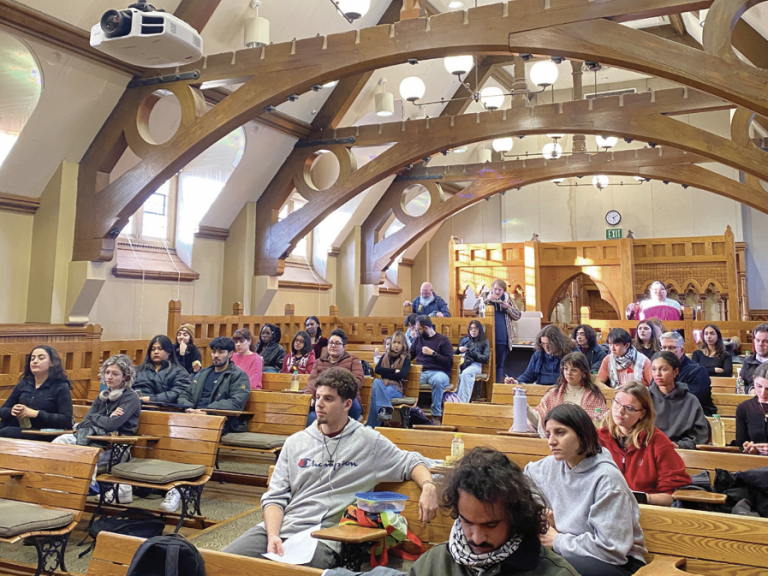By Chris Bulfinch
The pain and sorrow felt by victims of trauma and those dear to them, as well as the unease and fear of bystanders and witnesses, could cause discomfort and shame when told to the public. As more and more stories of abuse and crimes committed against women enter contemporary cultural consciousness, the method of storytelling has changed and evolved. On Friday, February 26, Trinity bore witness to a part of that narrative evolution, in a performance called “A Memory, A Monologue, A Rant And A Prayer” (MMRP). It was organized by the Women and Gender Resource Action Center (WGRAC) and performed in the chapel by a variety of Trinity students and faculty. “MMRP” was part of a number of programs, such as “Take Back the Night.” These programs addressed sexual assault, rape, and other forms of domestic and interpersonal violence.
MMRP, which is part of a larger collection of writings on women’s issues known collectively as “The Vagina Monologues,” deals with the stories of women who have, in one form or another, been exposed to sexual violence. MMRP was created by a number of writers who created their works free of charge for the two-week “Until the Violence Stops” festival in 2006. They were paid only in the “deep satisfaction that comes from serving the higher good,” to quote an introduction written for MMRP by Eve Ensler, the playwright who conceived The Vagina Monologues. The power of witness and words as a vehicle for contextualizing and expressing experience is a central theme of MMRP. The authors of these pieces are as varied as the stories themselves, with well-known names such as Maya Angelou mixed with those of less conspicuous writers. MMRP and The Vagina Monologues themselves are a part of a larger movement known as V-Day, a movement to raise awareness of issues of sexual violence and the subjugation of women in society. The Vagina Monologues, with MMRP as a subsidiary, have been performed in various contexts all over the world, and have been termed “the most important piece[s] of political theater of the last decade” by the New York Times.
MMRP opened in the chapel at eight in the evening, staffed by a number of Trinity students and other volunteers from Trinity’s faculty. The cast was predominantly Trinity students, with some faculty support. The $571 raised from admissions fees and the sales of tee shirts reading “Stop the Violence” were donated to The Interval House, a women’s shelter in Hartford.
After a brief introduction by Laura Lockwood, the director of WGRAC, the performances began with the reading of the above-mentioned introduction by Eve Ensler, with each individual monologue performed by different students, often in twos and threes. The stories had a cadence reminiscent of spoken word, and the theatrical intensity of the performance lent greater meaning to the words, as they reverberated around the vaulted hollow of the chapel.
Thematically, MMRP touched on women’s roles historically, their contemporary treatment, and the role of violence in their lives. MMRP touched on themes of war, with an evocative tale of an armless female veteran having homophobic slurs hurled at her. Child abuse was recognized with a story of a six-year-old girl and an unwanted advance at a summer camp. A story of a man who allows women victims of violence to commit extraordinary violence upon him. A monologue addressing the indignity and degradation of colonialism, imperialism, slavery, and gendered violence that has been visited upon women of color throughout the United States’ history concluded with a celebration of the “hardest-working vaginas in America.” Through the myriad of perspectives of the monologue, the listener was left with the sense that the issues dealt with in each one transcended individual experience and spoke to larger truths about the society in which women live, where the pressures and threats are salient, and the violence approached warfare. A portrait of a social and emotional battleground was painted in words for the audience, the writing itself bearing witness to the horror it described.
MMRP concluded with the entire cast chanting with an almost religious aura about words such as “shout,” “smack,” “bludgeon,” “fear,” “prostitution,” “poverty,” “IED,” “Peacekeeper,” “torture,” and perhaps most tellingly “silence.” The words, echoing off the stone walls of the chapel, brought to mind all of the myriad mechanisms of oppression, and provided a stark vantage on the issues being confronted by women all over the world. The recitation shifted at its end, however, concluding with “yes,” “hope,” “bread,” “shelter,” “you too?” “recognition,” “truth,” strength,” dignity,” “transformation,” “human,” and “together.” A message of uplifting hope, a message reiterating the capacity of language to communicate sentiments of compassion, empathy, and humanity seemed a fitting conclusion for a set of stories that so poignantly communicated themes of terror and violence; it spoke to the redeeming and cathartic quality of storytelling, demonstrating to the audience not only the stark reality of struggle and strife but the possibility of transcendent expression. A Memory, A Monologue, A Rant, and A Prayer made manifest issues so often relegated to the shadows and backwaters, and gave Trinity students a look into one of the most powerful and salient issues of today’s world.




+ There are no comments
Add yours